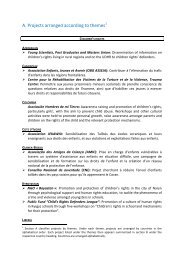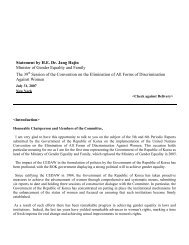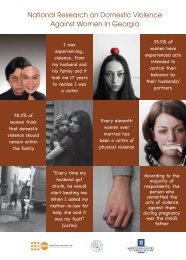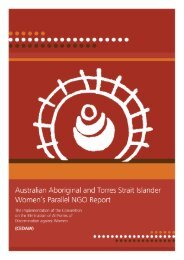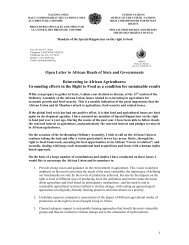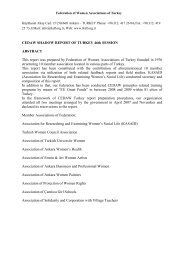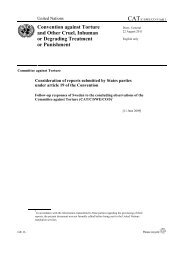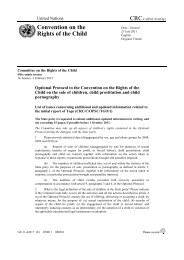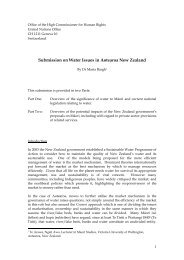Report - Office of the High Commissioner on Human Rights
Report - Office of the High Commissioner on Human Rights
Report - Office of the High Commissioner on Human Rights
- No tags were found...
Create successful ePaper yourself
Turn your PDF publications into a flip-book with our unique Google optimized e-Paper software.
employment or fur<str<strong>on</strong>g>the</str<strong>on</strong>g>r educati<strong>on</strong>, which in turn also limits a woman’s ability to acquire independent<br />
housing. The inability <str<strong>on</strong>g>of</str<strong>on</strong>g> women to leave because <str<strong>on</strong>g>of</str<strong>on</strong>g> <str<strong>on</strong>g>the</str<strong>on</strong>g> above factors, in additi<strong>on</strong> to <str<strong>on</strong>g>the</str<strong>on</strong>g> lack <str<strong>on</strong>g>of</str<strong>on</strong>g> shelters<br />
or half-way homes for women, make women more vulnerable to remaining in violent situati<strong>on</strong>s.<br />
Causes - Fiji is a very patriarchal culture - in its beliefs, attitudes and policies. For example, <str<strong>on</strong>g>the</str<strong>on</strong>g> banks<br />
require <str<strong>on</strong>g>the</str<strong>on</strong>g> husband to guarantee loans taken by a woman; <str<strong>on</strong>g>the</str<strong>on</strong>g> housing authority gives first preference<br />
to married couples.<br />
Due to custom, if a daughter runs away from her husband and returns to her family, her family is<br />
pressured to leave <str<strong>on</strong>g>the</str<strong>on</strong>g>ir home, to evict <str<strong>on</strong>g>the</str<strong>on</strong>g>mselves, or evict <str<strong>on</strong>g>the</str<strong>on</strong>g>ir daughter. The family has to leave if<br />
<str<strong>on</strong>g>the</str<strong>on</strong>g>ir daughter has a relati<strong>on</strong>ship with a man, o<str<strong>on</strong>g>the</str<strong>on</strong>g>r than her husband. Many women cannot leave<br />
<str<strong>on</strong>g>the</str<strong>on</strong>g> house after 6pm.<br />
Obstacles - In this system, where do divorced women or women escaping VAW go Women have few<br />
opti<strong>on</strong>s – relatives, HART or <str<strong>on</strong>g>the</str<strong>on</strong>g> Family Care Centre. Housing Assistance Relief Trust (HART) provides<br />
housing for single mo<str<strong>on</strong>g>the</str<strong>on</strong>g>rs, but requires women to produce documents such as birth and marriage<br />
certificates and a maintenance case number. It is difficult for women to get <str<strong>on</strong>g>the</str<strong>on</strong>g>se documents at times<br />
where <str<strong>on</strong>g>the</str<strong>on</strong>g>y are escaping violent situati<strong>on</strong>s. HART also has very c<strong>on</strong>trolling policies (e.g. women are<br />
not allowed to leave <str<strong>on</strong>g>the</str<strong>on</strong>g> house after 6pm; women are not allowed to have male visitors at <str<strong>on</strong>g>the</str<strong>on</strong>g> home;<br />
women can <strong>on</strong>ly move around if <str<strong>on</strong>g>the</str<strong>on</strong>g>y have filed a case against <str<strong>on</strong>g>the</str<strong>on</strong>g>ir husband and are receiving<br />
maintenance; when a woman moves in she has to pay <str<strong>on</strong>g>the</str<strong>on</strong>g> previous tenant’s bills). The judicial system<br />
is also an obstacle because it is slow and costly.<br />
Fur<str<strong>on</strong>g>the</str<strong>on</strong>g>r, <str<strong>on</strong>g>the</str<strong>on</strong>g> judiciary discriminate against women (i.e. magistrates and judges make gender biased<br />
decisi<strong>on</strong>s against women – ordering <str<strong>on</strong>g>the</str<strong>on</strong>g> woman to return everything <str<strong>on</strong>g>of</str<strong>on</strong>g> hers she had removed from<br />
<str<strong>on</strong>g>the</str<strong>on</strong>g> matrim<strong>on</strong>ial home). Most judges are male, even <str<strong>on</strong>g>the</str<strong>on</strong>g> few female judges are gender biased.<br />
Case studies (real names not used)<br />
Case Study 1: Sally<br />
Sally is 19 years old and is physically disabled. About two years ago Sally and her mo<str<strong>on</strong>g>the</str<strong>on</strong>g>r called FWCC<br />
and reported that Sally was being sexually abused by her fa<str<strong>on</strong>g>the</str<strong>on</strong>g>r. Both <str<strong>on</strong>g>the</str<strong>on</strong>g> mo<str<strong>on</strong>g>the</str<strong>on</strong>g>r and <str<strong>on</strong>g>the</str<strong>on</strong>g> daughter<br />
were very scared, <str<strong>on</strong>g>the</str<strong>on</strong>g> mo<str<strong>on</strong>g>the</str<strong>on</strong>g>r had suffered years <str<strong>on</strong>g>of</str<strong>on</strong>g> emoti<strong>on</strong>al, physical and psychological abuse by<br />
her husband. FWCC c<strong>on</strong>tacted <str<strong>on</strong>g>the</str<strong>on</strong>g> Social Welfare Department but no acti<strong>on</strong> was taken. In <str<strong>on</strong>g>the</str<strong>on</strong>g> end FWCC<br />
counsellors removed Sally, her mo<str<strong>on</strong>g>the</str<strong>on</strong>g>r and younger sister from <str<strong>on</strong>g>the</str<strong>on</strong>g> house. FWCC arranged for<br />
accommodati<strong>on</strong> at <str<strong>on</strong>g>the</str<strong>on</strong>g> Salvati<strong>on</strong> Army Family Care Centre. Sally laid charges against her fa<str<strong>on</strong>g>the</str<strong>on</strong>g>r.<br />
However, after sometime Sally’s mo<str<strong>on</strong>g>the</str<strong>on</strong>g>r returned to her husband.<br />
Sally had to be moved to various places because <str<strong>on</strong>g>the</str<strong>on</strong>g>re were no adequate facilities to meet her needs;<br />
she was especially vulnerable due to her disabilities. She is currently in <str<strong>on</strong>g>the</str<strong>on</strong>g> care <str<strong>on</strong>g>of</str<strong>on</strong>g> an instituti<strong>on</strong> that<br />
provides educati<strong>on</strong> for children with disabilities; however this place is temporary and is not appropriate<br />
for her because she is an adult.<br />
Case Study 2: Sera<br />
Sera got married Joe and moved to her husband’s village. Sera’s family got her a job in Sydney,<br />
Australia. A few m<strong>on</strong>ths later <str<strong>on</strong>g>the</str<strong>on</strong>g>y also found a job for <str<strong>on</strong>g>the</str<strong>on</strong>g> husband in Sydney. The couple worked<br />
156 WOMEN’S RIGHTS TO ADEQUATE HOUSEING AND LAND




